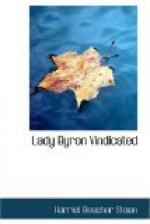The writer in ‘Blackwood’ and the indignation of the English public, of which that writer was the voice, were now particularly stirred up by the appearance of the first two cantos of ‘Don Juan,’ in which the indecent caricature of Lady Byron was placed in vicinity with other indecencies, the publication of which was justly considered an insult to a Christian community.
It must here be mentioned, for the honour of Old England, that at first she did her duty quite respectably in regard to ‘Don Juan.’ One can still read, in Murray’s standard edition of the poems, how every respectable press thundered reprobations, which it would be well enough to print and circulate as tracts for our days.
Byron, it seems, had thought of returning to England, but he says, in the letter we have quoted, that he has changed his mind, and shall not go back, adding ’I have finished the Third Canto of “Don Juan,” but the things I have heard and read discourage all future publication. You may try the copy question, but you’ll lose it; the cry is up, and the cant is up. I should have no objection to return the price of the copyright, and have written to Mr. Kinnaird on this subject.’
One sentence quoted by Lord Byron from the ‘Blackwood’ article will show the modern readers what the respectable world of that day were thinking and saying of him:—
’It appears, in short, as if this miserable man, having exhausted every species of sensual gratification—having drained the cup of sin even to its bitterest dregs—were resolved to show us that he is no longer a human being even in his frailties, but a cool, unconcerned fiend, laughing with detestable glee over the whole of the better and worse elements of which human life is composed.’
The defence which Lord Byron makes, in his reply to that paper, is of a man cornered and fighting for his life. He speaks thus of the state of feeling at the time of his separation from his wife:—
’I was accused of every monstrous vice by public rumour and private rancour; my name, which had been a knightly or a noble one since my fathers helped to conquer the kingdom for William the Norman, was tainted. I felt that, if what was whispered and muttered and murmured was true, I was unfit for England; if false, England was unfit for me. I withdrew; but this was not enough. In other countries—in Switzerland, in the shadow of the Alps, and by the blue depth of the lakes—I was pursued and breathed upon by the same blight. I crossed the mountains, but it was the same; so I went a little farther, and settled myself by the waves of the Adriatic, like the stag at bay, who betakes him to the waters.
’If I may judge by the statements of the few friends who gathered round me, the outcry of the period to which I allude was beyond all precedent, all parallel, even in those cases where political motives have sharpened slander and doubled enmity.




